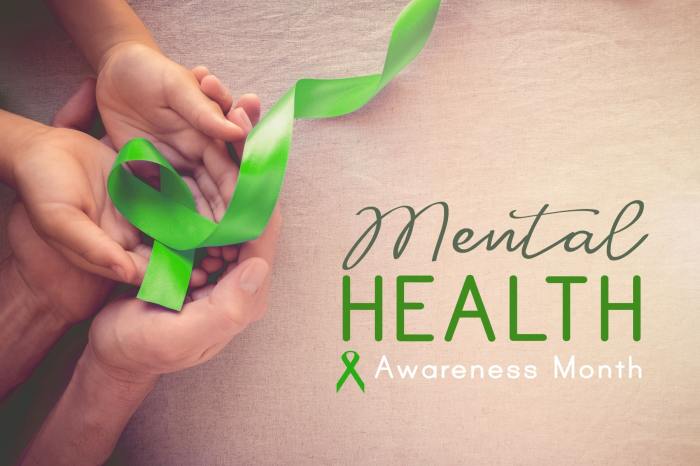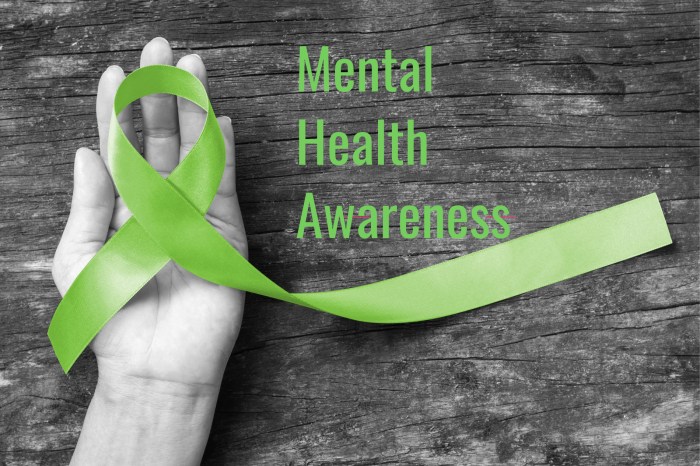Mental Health Awareness takes center stage in today’s society, shedding light on the importance of understanding and supporting mental well-being. From combating stigma to emphasizing self-care, this topic dives deep into crucial aspects of mental health that impact individuals and communities alike. Get ready to explore the world of mental health awareness through a lens that’s both enlightening and empowering.
Importance of Mental Health Awareness
Mental health awareness is crucial in society to break the stigma surrounding mental illnesses and promote overall well-being. By increasing awareness, individuals are more likely to seek help, access resources, and support one another in times of need.
Positive Impact on Individuals and Communities
- Improved Quality of Life: Those with mental health awareness are more likely to practice self-care, seek therapy, and maintain healthy relationships.
- Reduced Stigma: Increased awareness can help combat negative stereotypes and discrimination against individuals with mental health conditions.
- Stronger Support Networks: Communities that prioritize mental health awareness are better equipped to provide support and resources for those in need.
Global Prevalence of Mental Health Issues
According to the World Health Organization (WHO), approximately 1 in 4 people globally will experience a mental health disorder at some point in their lives. This highlights the importance of raising awareness and providing accessible mental health services to those in need.
Stigma Surrounding Mental Health

The stigma surrounding mental health problems is a major barrier that prevents individuals from seeking help and support. It is often fueled by misconceptions, fear, and discrimination, leading to negative attitudes and behaviors towards those experiencing mental health issues.
Impact of Stigma
Stigma can prevent individuals from acknowledging their struggles and seeking professional help. It can create feelings of shame, embarrassment, and isolation, making it harder for people to talk openly about their mental health concerns. This can result in delayed treatment, worsening of symptoms, and overall poorer mental health outcomes.
Combatting Stigma, Mental Health Awareness
- Educate and raise awareness: Providing accurate information about mental health can help dispel myths and reduce stigma.
- Encourage open conversations: Creating a safe and supportive environment where individuals feel comfortable discussing their mental health can help break down barriers.
- Show empathy and support: Being non-judgmental and offering understanding to those struggling with mental health issues can make a significant difference in reducing stigma.
- Advocate for policy changes: Supporting policies that protect the rights of individuals with mental health conditions can help reduce discrimination and stigma in society.
Mental Health Awareness Campaigns

In recent years, there have been several successful mental health awareness campaigns from around the world that have made a significant impact in breaking the stigma and promoting understanding of mental health issues.
Bell Let’s Talk Campaign
The Bell Let’s Talk campaign in Canada is one of the most well-known mental health awareness initiatives. It focuses on starting conversations about mental health and reducing stigma through social media engagement. The campaign encourages people to use the hashtag #BellLetsTalk, and for every interaction on social media platforms, Bell donates funds towards mental health initiatives. This approach has been highly effective in raising awareness and normalizing discussions around mental health.
Heads Together Campaign
The Heads Together campaign in the United Kingdom, spearheaded by members of the British royal family, aims to change the conversation around mental health and provide support for those struggling. By partnering with various organizations and using social media to share personal stories and resources, the campaign has successfully encouraged people to seek help and support one another. The openness and honesty displayed by public figures have helped reduce the stigma associated with mental health issues.
#ItGetsBrighter Campaign
The #ItGetsBrighter campaign in Australia focuses on sharing stories of hope and recovery to inspire those struggling with mental health challenges. Through social media platforms, individuals share their journeys and offer support to others facing similar issues. This campaign has been effective in providing a sense of community and hope to individuals battling mental health issues.
Effectiveness of Social Media in Mental Health Awareness
Social media plays a crucial role in promoting mental health awareness by reaching a wide audience and facilitating open discussions. Platforms like Instagram, Twitter, and Facebook allow individuals to share their experiences, access resources, and connect with others who are going through similar struggles. The use of hashtags, campaigns, and personal stories on social media has proven to be a powerful tool in breaking down barriers and fostering a supportive community for mental health advocacy.
Importance of Self-care in Mental Health
Self-care plays a crucial role in maintaining good mental health by helping individuals manage stress, build resilience, and improve overall well-being. It involves taking intentional actions to prioritize one’s physical, emotional, and psychological needs.
Examples of Self-care Activities
- Practicing mindfulness and meditation to reduce anxiety and increase self-awareness.
- Engaging in regular physical exercise to boost mood and reduce symptoms of depression.
- Maintaining a healthy diet to support brain function and improve energy levels.
- Setting boundaries and saying no when feeling overwhelmed to prevent burnout.
Impact of Self-care on Mental Health
Self-care has a significant impact on overall mental health and quality of life. By incorporating self-care practices into daily routines, individuals can better cope with challenges, enhance self-esteem, and foster a sense of control over their well-being. Prioritizing self-care can lead to increased emotional resilience, improved relationships, and a more positive outlook on life.
